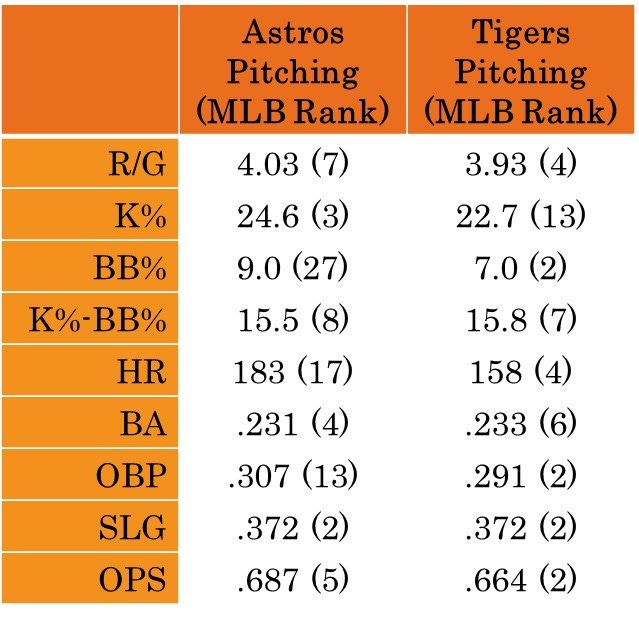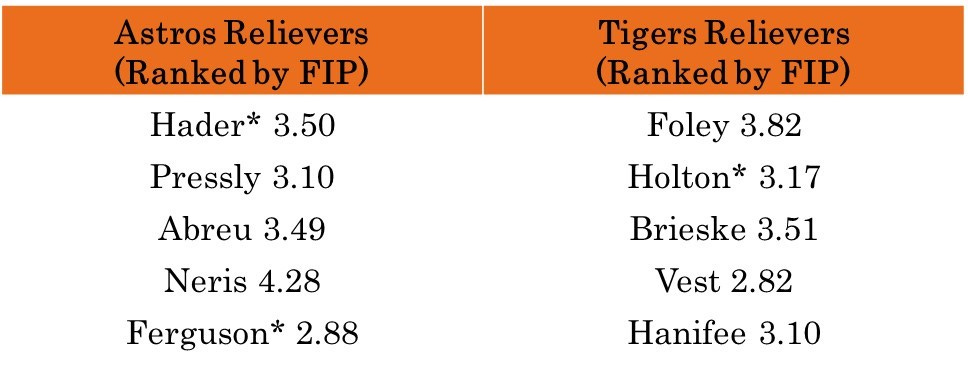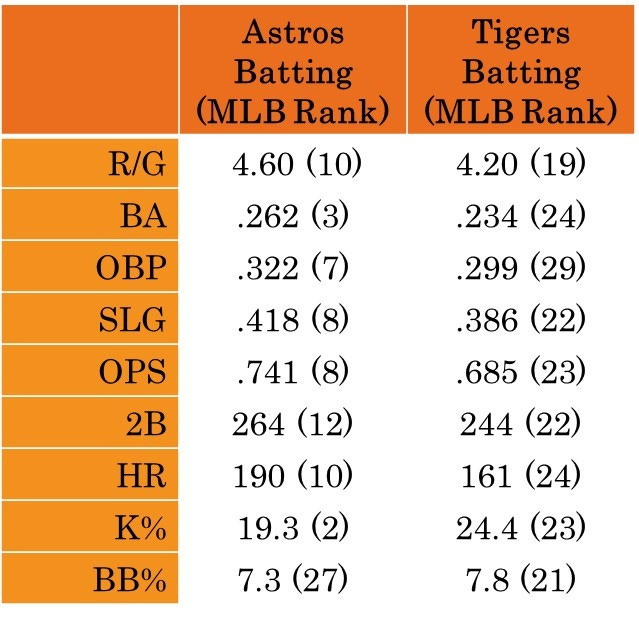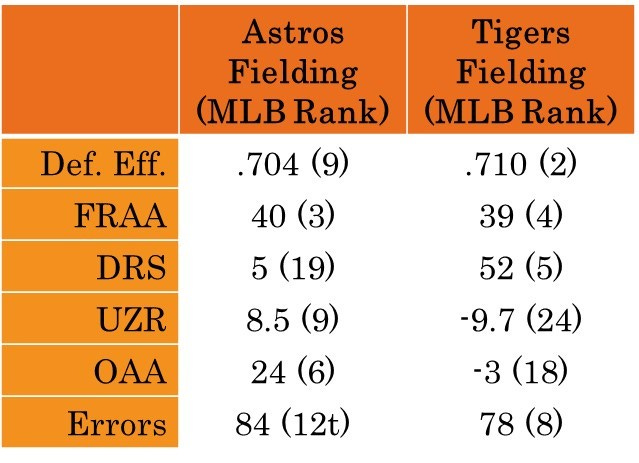My Wild Card Series Preview: Two Good Run Prevention Teams, But the Astros Have a Much Better Offense
The Tigers have a very slight advantage in run prevention, but the Astros have a big advantage in run scoring. Will that advantage show up in a Best-of-3 Series?
It was a “fun with selective endpoints” season. What do I mean by that? At different points this season, I heard broadcasters says “Since [insert date here], the [insert team here} has been the best team in baseball. I heard it yesterday watching the Mets broadcast of their playoff clinching extra-day win. And I’ve used it myself to discuss our Houston Astros. I’ve heard it for the Detroit Tigers, who were the best team in baseball over the last 2 months of the season, turnaround around a season in which they were sellers at the deadline into an improbably playoff run.1
Of course, these three team all had to become one of the best in baseball to make the playoffs because each of these teams were for a period, one of the worst teams in baseball. The Astros, Tigers, and Mets all were 9 games or more under .500 at one point this season.
In the Year of the Turnaround, the Astros-Tigers series is one of the Wild Card Series of the Turnaround.
That the Tigers got into a big deficit was not too surprising. The Tigers are a young team that seemed a year away from real contention until their big winning stretch at the end of the season.
But for the Astros, the early season collapse was quite surprising. This was expected to be a winning team this season and the turnaround showed the early losing stretch was an aberration. This was indeed a very good baseball team.
But before we put the bad April behind us forever, it did in the end take one thing from the Astros—the ability to earn a bye into the Division Series, which the Astros have earned in each of the last 6 playoffs where that was available to them.
The best piece of playoff analysis ever given was by As GM Billy Beane who is quoted in Moneyball as saying that the playoffs are a crapshoot. Winning over a full season is about winning in the long run—small advantage build up over time. Winning in a short series is about hoping those advantages actually matter and that fluke events do not overcome them.
The Wild Card Series is the ultimate short series—a best of 3. Have a bad two days—or have an unexpected hero for your opponent have a great day or two—and that’s it. The Astros punishment for their awful start to the season is that they have to endure one extra series dice roll in this series.
The good news is that the Astros are a better team than the Tigers. The Tigers have a very slight advantage in run prevention, but the Astros have a big advantage with the bat in their hands. The Tigers are a bottom tier offense, and their low walk approach might not be able to take advantage of the high walk rate of the Astros pitchers.
But over three games, those advantages might mean very little. While we do this every season, it’s heart-in-your-throat time for us Astros fans. It’s October and we’re in it.
Let’s see how these teams match up.
The Pitching
I start with the pitching because it’s far and away the biggest strength of the Tigers. They are a pitching and defense team and a big improvement by the pitching staff keyed the team’s late hot streak that propelled them to the playoffs. As you can see from the chart below, the Tigers were the 4th best team in the majors at preventing runs this season.
But the Astros are of course a strong run prevention team themselves. They are the seventh best run prevention team in baseball, allowing only 0.1 more runs per game than the Tigers. But the two pitching staffs get to effectiveness in different ways. For the Tigers, it is through pinpoint control. The Tigers have allowed the second lowest walk rate in the majors, but their strikeout rate is decidedly mid-tier. The Astros give up a lot of walks (27th highest rate in the majors) but erase many of their mistakes via strikeouts (3rd highest rate in the majors). When you combine the two into the K%-BB% stat, the pitching staffs are right next to each each other in their MLB rank.
One big advantage for the Tigers staff is they give up fewer homers than the Astros. Some of that is due to the more spacious dimensions of their home park, but some comes from better pitching. If you believe in the “ball go far, team go far” philosophy of the playoffs (as I do), this is a trend the Astros pitchers must buck.
The Rotation
The Tigers sparked their turnaround this season by almost eschewing their starting rotation after they traded Jack Flaherty to the Dodgers. They turned to a large number of openers and bullpen games and it worked. For them, this section almost seems unnecessary, and do not expect to see their starter in Games 2 and 3 very long. I have left the Game 3 starter section blank—I think they’ll pitch a bullpen game on Thursday if necessary.
But the exception to this pattern is a big one. Tarik Skubal won the AL pitching triple crown this season, leading the league in wins, ERA, and strikeouts. He’s excellent and will be a big challenge for 6 innings later today.
But that advantage is muted because the Astros have their own excellent starting pitching to face off against Skubal in Framber Valdez. If Valdez outpitches or even matches Skubal today, it mitigates the advantage created by the Tigers having the best player in the series.
After Valdez, the Astros are likely to go with Hunter Brown and Yusei Kikuchi in some order. Both have improved greatly over the last half of the season, and should be good bets to get outs the first two times through the order.
The Bullpen
Who has a better bullpen? By fame and contract status, the Astros is the Astros. Pressly, Abreu, and Neris have all been stars in the postseason before, and Hader signed one of the biggest contracts ever by a reliever.
But by production, the answer may be the Tigers, who have ridden a bunch of no-name relievers to the hottest September in baseball. Expect to see a lot of these pitchers this series as AJ Hinch has declared his pitching plan for the series is “Tarik Skubal tomorrow and pitching chaos the rest of the way.”
The Offense
How can I put this? The Tigers hitting is not good. They are a bottom third team in the majors in batting average, slugging percentage, home runs, and walk rate. Their on base percentage is near the bottom—29th best in the majors. They are efficient at scoring runs. They are 19th best in baseball in runs per game.
The Astros have a distinct offensive profile that I covered recently—describing it in the headline as high contact, low walk, and middling power. The Astros are among the major’s best teams at batting average and avoiding strikeouts, but don’t do anything else a a top level. In many ways, the Astros profile as hitters is the same as the Tigers profile as pitchers.
The Lineups
The Astros advantage on offense is easy to see when you stack the two team’s lineups against each other as I do here. The Astros have the two best offensive players in the series in Kyle Tucker and Yordan Alvarez. Of the 8 best hitters in the series, the Astros have 6 of them. And over half of the Tigers hitters are below league average (note: OPS+ is scaled so that 100 is league average).
It is also worth noting one other advantage that the Astros have against the Tigers. The Tigers are stacked with left handed hitters—5 of their regulars are lefty swingers, including their two best hitters in Kerry Carpenter and Riley Greene. But two of the Astros starting pitchers this series—Valdez and Kikuchi—are left handed. The Tigers like to platoon, and Carpenter has not started against the last 4 left handed starters they faced in must-win games down the stretch. Would AJ Hinch hold his best hitter back in 2 of 3 games and wait until a right handed reliever comes in to use Carpenter? Maybe.
Fielding
By nearly all metrics, the Tigers have one of the best fielding teams in the majors. They are particularly strong in the outfield, where Parker Meadows is an excellent defensive center fielder, which allows Riley Greene to be a center fielder playing right field. Overall, the Tigers are second best team at defensive efficiency, a simple measure of the percentage of balls in play that are turned into outs.
After a tough start to the season, Astros fielders turned it around and became an above average defensive team, finishing ninth in defensive efficiency. They similarly are strongest in the outfield (Jake Meyers, 14 Outs Above Average) but are weak on the right side of the infield—Altuve is -8 OAA and both Jon Singleton and Yainer Diaz are below average at first base.
Keys to the Series
How much and how well will Yordan Alvarez play? To state the obvious, the Astros are a better team with Yordan Alvarez in the lineup. Alvarez injured himself last weekend and has not played since. On Monday, Brian McTaggart reported that Alvarez would be re-evaluated on Tuesday morning and “it’s a 50-50 decision whether Alvarez is on the playoff roster tomorrow.” The Astros would still have a better lineup than the Tigers if Jon Singleton takes Alvarez’s at bats, but it would certainly be lessened.
Does the Astros left handed starting pitchers give them an advantage over the lefty bats of the Tigers? The Tigers two best hitters are left handed, and five of their best nine hitters are left handed. AJ Hinch will platoon, but that also created advantages for the Astros, as one player Hinch platoons is Kerry Carpenter, the Tigers best hitter. Carpenter still could play a big role as he will certainly pinch hit in the late innings against relievers such as Ryan Pressly and Bryan Abreu. But overall, having two left handed starters is an extra advantage for the Astros.
The Astros will put lots of balls in play against the Tigers. Will they find holes? Tigers pitchers don’t have many strikeouts and walks, and neither do the Astros hitters. The Astros hit a lot of singles as a result, but the Tigers are one of the best teams at turning batted balls into outs. Expect a lot of batted balls from Astros hitters. If they find holes, they’ll score enough runs to make it difficult for the offensively-challenged Tigers to match them.
Could Ronel Blanco and Spencer Arrighetti be weapons as long men in the bullpen? The Astros have a deep starting rotation, and it is expected that Ronel Blanco and Spencer Arrighetti will work from the bullpen. One way that Joe Espada might avoid the third time through the order penalty is to let Blanco and Arrighetti serve as long relievers and take the third time through the order in Games 2 and 3.
Whose bullpen pitches better? Both teams see their bullpens as big strengths, with the Astros sinking big resources into their bullpen and the Tigers turning to it to turn their season around in the last 6 weeks of the season. In what is likely to be a low scoring series, whichever team gets the best performance from their relievers will have a big advantage.
Concluding Thoughts
The Tigers are a very good run prevention team, and they used innovative pitching strategies over the last two months of the season to spark the big winning streak that propelled them on their playoff run.
But the Astros are also a good run prevention team, and their pitching turnaround—Brown and Arrighetti overcame disastrous Aprils and Kikuchi improved greatly under Astros coaching and strategies—has been just as important to the Astros turaround from 7-19 to division champs.
If the Astros run prevention skills mitigate most of the Tigers advantages there, the big advantage in this series are the Astros bat. Or really, the lack of bats for the Tigers, who are bottom tier offense with only two top quality hitters—one of which will only start one game this series.
As such, the Astros are a better team. But the nature of short series baseball is that any advantage one team has is small in the end. The Astros scored a lot more runs than the Tigers over 162 games, but they are not playing 162. They are playing 3 games.
If the playoffs are a crapshoot, a 3 game series is even more of a crapshoot than a 7 games. The Astros are the better team this series. Let’s hope that matters.
I have also heard this for the Diamondbacks. It’s an indication that needing to be the best team in baseball for a while to make the playoffs because you have slumped in the rest of the season is not always viable.








